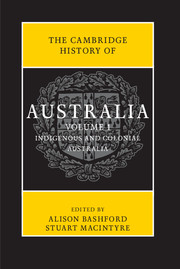Book contents
- Frontmatter
- Contents
- Abbreviations
- List of maps
- List of figures
- List of tables
- Notes on contributors
- Map
- Preface
- Introduction
- PART I
- PART II
- 11 Environmental transformations
- 12 Population and health
- 13 The economy
- 14 Indigenous and settler relations
- 15 Education
- 16 Law and regulation
- 17 Religion
- 18 Colonial science and technology
- 19 Gender and colonial society
- 20 Art and literature: a cosmopolitan culture
- 21 Empire: Australia and ‘Greater Britain’, 1788–1901
- 22 Colonial Australia and the Asia-Pacific region
- 23 The Australian colonies in a maritime world
- Further reading
- Chronology
- Index
- Frontmatter
- Contents
- Abbreviations
- List of maps
- List of figures
- List of tables
- Notes on contributors
- Map
- Preface
- Introduction
- PART I
- PART II
- Further reading
- Chronology
- Index
20 - Art and literature: a cosmopolitan culture
from PART II
Published online by Cambridge University Press: 05 November 2013
- Frontmatter
- Contents
- Abbreviations
- List of maps
- List of figures
- List of tables
- Notes on contributors
- Map
- Preface
- Introduction
- PART I
- PART II
- 11 Environmental transformations
- 12 Population and health
- 13 The economy
- 14 Indigenous and settler relations
- 15 Education
- 16 Law and regulation
- 17 Religion
- 18 Colonial science and technology
- 19 Gender and colonial society
- 20 Art and literature: a cosmopolitan culture
- 21 Empire: Australia and ‘Greater Britain’, 1788–1901
- 22 Colonial Australia and the Asia-Pacific region
- 23 The Australian colonies in a maritime world
- Further reading
- Chronology
- Index
- Frontmatter
- Contents
- Abbreviations
- List of maps
- List of figures
- List of tables
- Notes on contributors
- Map
- Preface
- Introduction
- PART I
- PART II
- Further reading
- Chronology
- Index
Summary
The history of art and literature in the Australian colonies, at least in the first half of the nineteenth century, can be understood not as the beginnings of a tradition that led naturally to the nationalist culture of the Federation period, but as a series of attempts to establish forms of subjectivity and sociability, and the cultural institutions associated with them, deriving from late-Georgian and Victorian Britain. These typically looked backwards rather than forwards, and were often unsuccessful in the Australian context. Since the idea of the nation functioned as an absence in these early years, we might begin by asking: what were Australian art and literature like before the nation? How and in relation to what kinds of social and intellectual formations can colonial culture best be located?
When Governor Lachlan Macquarie arrived in Sydney in 1810, he appointed Michael Massey Robinson, an emancipated convict, to write commemorative verses in celebration of the birthdays of King George III and Queen Charlotte. Robinson's odes were read at Government House and published in the colony's only newspaper, the Sydney Gazette. Since the accession of George I it had been incumbent upon all British poets laureate to present, annually, a New Year's Ode and a Birthday Ode to be performed before the King and court at St James's Palace in London. Robinson's birthday odes were not seen, then, as the commencement of a new national literature, but as a way of modelling the fledgling institutions of colonial society on the protocols of Augustan good taste. His ‘ODE for the Queen's Birth-Day, 1816’ was about the crossing of the Blue Mountains west of Sydney and the expansion of agriculture across the continent. Robinson created an originary narrative by conjuring a line of explorer-heroes from Aeneas and Columbus, and locating the beginnings of colonial history in the ancient Mediterranean and Atlantic worlds. These epic associations were then transferred to the more recent history of inland exploration in the New World.
- Type
- Chapter
- Information
- The Cambridge History of Australia , pp. 487 - 510Publisher: Cambridge University PressPrint publication year: 2013



